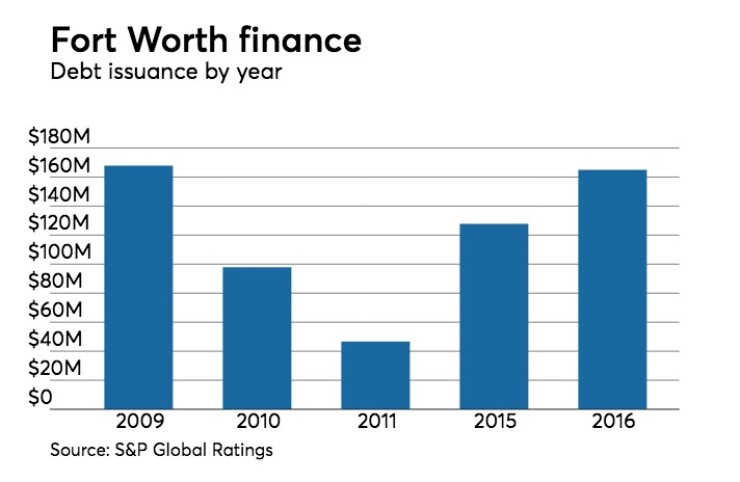DALLAS – Less than two weeks after Fort Worth voters approved $400 million of general obligation bonds, the city took a downgrade from S&P Global Ratings and an outlook shift to negative from Fitch Ratings.
S&P on Thursday lowered Fort Worth’s rating to one notch to AA. The outlook is stable.

Fitch lowered the outlook to negative on its AA-plus rating in advance of a June 6 sale of $61.84 million of GO bonds and $12.73 million of tax notes.
As of Friday, Moody’s Investors Service still had a negative outlook on its Aa3 rating.
Like nearby Dallas and Texas’ largest city of Houston, Fort Worth suffered the dent in its credit due to underfunding of its pension obligations.
"The downgrade reflects our view of the city's increasing pension liability and lack of funding the actuarially determined contribution, which we believe is masking Fort Worth's budgetary performance, and will pressure finances until the city adopts a creditable plan that demonstrates a positive impact on the funding status," said S&P Global Ratings analyst Ann Richardson.
Offsetting the pension problems are the city’s “very strong management,” healthy economy and budget flexibility, Richardson noted.
“If the city is unsuccessful in enacting pension reform, or we believe the changes adopted will not fully address the growing pension liability, we could take further rating action,” she cautioned.
“We could raise the rating if there were a significant improvement in the pension funding status, without reserve levels deteriorating, and the city experienced continued economic gains that improve our view of the economy.”
Fitch analyst Steve Murray said the resolution of the pension dilemma will be the key to any downgrade or improved outlook.
“The city is currently negotiating plan reforms with city employees, and prompt agreement on a meaningful reform package (plus any legislative approval) is critical to maintenance of the current rating,” Murray wrote.
Fort Worth’s combination of overall debt and net pension liability is approaching 20% of personal income in the city and is becoming a larger burden on the city's resources, Murray wrote.
“While historical performance over the last 10 years shows fairly modest revenue growth (tracking inflation), the past decade witnessed a confluence of recession and collapse of natural gas prices that significantly impacted operating revenues for several years,” Murray wrote. “The positive growth prospects for the city and for the Dallas-Fort Worth region suggest continuation of recent healthy gains in economically sensitive revenues. Fort Worth sales tax collections have averaged more than 5% annual increases over the past five years.”
On May 5, voters showed strong support for $400 million of general obligation bonds for projects that include streets, parks and public safety. On the same day, voters also passed $250 million of flood control bonds for the Tarrant Regional Water District, which will play a key role in developing a $1 billion site near downtown known as Panther Island.
As the western anchor of the Dallas-Fort Worth metroplex, Fort Worth has a population of more than 850,000 and an economy built on energy, military defense, transportation and construction. The city is home to the headquarters of the BNSF Railway and American Airlines.
Lockheed Martin is the city's second largest employer with about 13,700 workers. Other noteworthy projects include continued expansion at Alliance Texas logistics center, recent completion of a new 25-story downtown office tower, and ongoing construction of a new city-owned multi-purpose arena scheduled for completion in November 2019.





